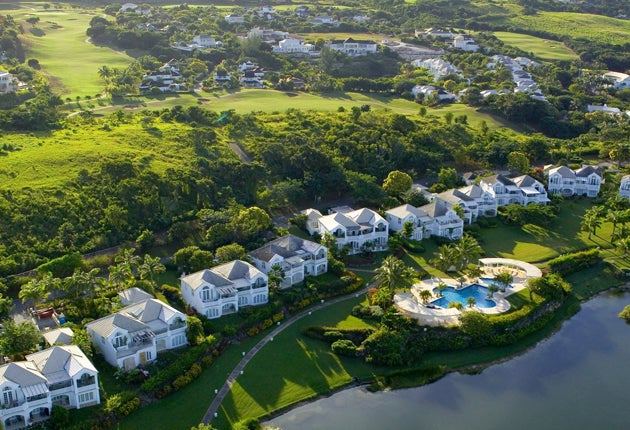Barbados is queen of the Caribbean
The island remains a favourite with British buyers. Julian Knight and Felicity Cannell report

It is not hard to see why Barbados is considered the premier destination for Britons thinking of buying property in the Caribbean.
Turquoise-coloured sea and beaches that live long in the memory are just a starter; add to this a warm sunny climate all year round, friendly people, infrastructure that is more first than third world and stable government and it's easy to see why Barbados still holds many in thrall.
"Barbados has always been a favourite among UK buyers – it's known as 'Little Britain' – and the current market has proved that," said Georgina Richards from estate agents Knight Frank International. "We've traditionally sold in British Virgin Islands, Mustique and Grand Cayman as well, and a couple of years ago buyers were investigating the more peripheral islands of the Caribbean, but the market's contracted right back to Barbados. It's our core market: more than 90 per cent of buyers are looking there."
Although the Barbadian market did suffer a downturn in late 2008 and 2009, and several high-profile developments such as Four Seasons and Apes Hill were subject to delays, it seems that building work is commencing again on the island. At the luxurious Royal Westmoreland development, for instance, a new building phase, Sugar Cane Ridge, is about to begin which will have 14 four-bed villas available from $1.2m (£800,000). "Some developers understandably have struggled with financing their projects," said Ian Cox from Royal Westmoreland. "Here we have had no such difficulty as we are a large, well-established development which has grown organically over years, regardless of credit crunches or world economic problems."
The market has definitely picked up of late. "At times like these, overseas buyers want a safe market in a stable economy. Barbados provides that, in an absolutely idyllic setting," said Tim Morgan, the managing director Cluttons Barbados.
But the dream of owning in Barbados – even with its daily flights to the UK and not too taxing four-hour time difference – is usually presumed to be the preserve of only the well to do.
Certainly the little Caribbean island (just 167 square miles) attracts buyers from the world of sport, music and business. Royal Westmoreland (www.royalwestmoreland.com, 01524 782 649), for instance, boasts Gary Lineker, Joe Calzaghe, Michael Vaughan, Ian Woosnam and most recently Wayne Rooney as villa owners.
However, it is possible to own a place in Barbados for the sort of money that you'd expect to pay for a terraced house in one of the UK's big cities. The Weston St James development, near the fashionable but rather unfortunately named Holetown on the prime west side of the island, has one-bed flats from £112,900 through estate agents Cluttons. The development is due to be completed in mid-2011 and the first phase is 75 per cent sold out.
Weston is small by Barbados standards – 51sq m – for the smallest, one-bed flat. This is a similar price for square footage compared with much larger properties, so developers are using new tactics to attract buyers. Holidaymakers, for example, would use apartments for a few weeks a year and rent them out the rest of the time. "Buyers want two things – spectacular location and tremendous value," said Mr Morgan.
Get a free fractional share worth up to £100.
Capital at risk.
Terms and conditions apply.
ADVERTISEMENT
Get a free fractional share worth up to £100.
Capital at risk.
Terms and conditions apply.
ADVERTISEMENT
At Royal Westmoreland one-bed apartments of 77sq m are available from $429,000. All owners at Westmoreland get access to the nearby spa, private beach, on-site swimming pool, restaurant, gym and golf course. Owners are free to rent out their properties for as long or as little as they choose.
Capital appreciation is possible: the lakeside villas at Westmoreland were bought for about $700,000 in 2003 and are now estimated to be worth more than double that. Crucially, building space on the island is limited. Much of the west coast which has the most picturesque beaches and amenities is built upon. On the wilder east coast, which bears the full brunt of the Atlantic, there is room for development but swimming is often hazardous.
Although many purchasers pay in cash, home loans are available. "It's not a market with a lot of lenders. Just a few local and international banks, including First Caribbean and Scotia banks, so variable rates tend to be on the higher side," said Miranda John from mortgage brokers Savills. "Generally, you will pay about 3.5 per cent above the US interbank lending rate."
Mortgage loan-to-value ratios tend to be capped at 70 per cent and banks make lending decisions on a case-by-case basis, Ms John says. "Full status is taken into account – income, other mortgages, such as those in the UK, assets and debts. The parameters are straightforward – can you afford to service the debt?"
Fees are on the low side, akin to the UK. Expect to pay legal fees of about 1 to 2 per cent. Selling is a different story, with 1 per cent stamp duty and 2.5 per cent transfer tax. So combined with legal fees of 1-2 per cent and estate agent fees, you're heading towards 8-9 per cent when selling. But for many Britons once settled in Barbados the last thing on their mind is selling.
Join our commenting forum
Join thought-provoking conversations, follow other Independent readers and see their replies
Comments
Bookmark popover
Removed from bookmarks